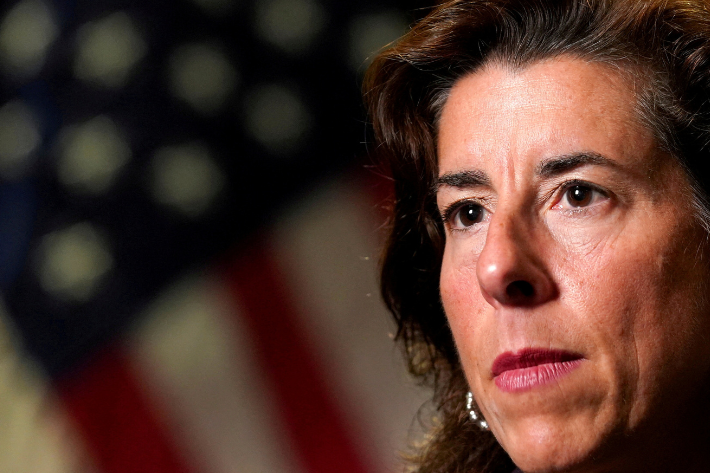US Commerce Secretary Gina Raimondo said on Monday the expanding sales of Chinese electric vehicles (EVs) in the West were a national security risk for the United States and the European Union.
“A sophisticated EV, and then an autonomous vehicle, is filled with thousands of semiconductors and sensors. It collects a huge amount of information about the driver, the location of the vehicle, the surroundings of the vehicle,” Raimondo said at an event hosted by US think tank Atlantic Council.
“Do we want all that data going to Beijing?”
Also on AF: Teradyne Pulled $1bn of Chip Testing Equipment Out of China
The Commerce secretary had earlier noted how Beijing has banned the passage of vehicles made by US EV giant Tesla in certain parts of the country, citing national security concerns.
“Well, think about that,” she said.
Raimondo made her comments in a conversation alongside Margrethe Vestager, the Executive Vice President of the European Commission for A Europe Fit for the Digital Age, after the two leaders held talks on US-EU collaboration in trade and tech, earlier in the day.
She also went on to draw parallels between EVs and semiconductors — an area that has seen the US and China at loggerheads over access to cutting-edge technology.
“That’s just one example, EVs… You could ask the same questions about semiconductors, many of which are made in China,” Raimondo said.
The US Commerce Department, under Raimondo’s leadership has, since October 2022, sought to cut off China’s access to cutting-edge technology critical to making advanced chips.
From prohibiting Nvidia — the most valuable US chipmaker — from selling some its most advanced chips to China, to pulling in allies Japan and Netherlands into the chip war, and cutting off Beijing’s access to key chipmaking equipment, Washington has aggressively pushed to throttle its key economic rival’s tech progress.
View this post on Instagram
And Raimondo has vowed to tighten those restrictions annually.
“Europe and the United States have huge trading relationships with China. Hundreds of billions of dollars. And that is a good thing,” Raimondo said at the Atlantic Council event.
“Selling goods to China creates jobs in both of our countries… Having said that, there are real national security concerns for both of us… And we have to be eyes wide open about that,” she added.
Raimondo further referred to cooperation between the US and Europe in implementing export controls targeting China.
“We need to move in that direction,” she said.
Green steel pact
EU Commissioner Vestager said, meanwhile, that the bloc viewed China as a systemic rival and an economic competitor.
She said the EU was working towards its “strategy for economic security” that included rules for research organisations “to do their due diligence to know who they are actually dealing with”, ensuring European countries “screen foreign direct investments” and implementing export controls according to each country’s competency.
The EU is already investigating China’s state support for EV makers such as BYD, Geely and SAIC, and European carmakers have repeatedly raised concerns about the “invasion” of cheaper Chinese EVs into the market — an issue Raimondo referred to as well.
Earlier in the conversation, Raimondo also spoke of “working on a global steel arrangement”.
“We need to prioritise our trading partners that have green steel, green aluminium, sustainable, you know, sources of energy,” she said.
If it comes into force, such an agreement will pose more trade challenges for China — the world’s largest steel exporter — considering most factories in the country are powered by coal.
Regulating AI in focus
Much of the conversation with the two leaders, meanwhile, was focused on the regulation and standardisation of AI, amid increasing concerns around the technology’s potential to disrupt the global economy and labour markets.
“We need to be much more present in standardisation foras because they are being more and more dominated by non-market players, or Chinese players,” EU commissioner Vestager said.
Raimondo, echoing Vestager’s comment, added the US and EU needed to continue working together in that area.
“I promise you if the US and the EU don’t show up, China will, autocracies will,” she said.
- Vishakha Saxena
Also read:
US Plans New Rules for Cloud Firms to Cut Off China AI Access
EU to Target Chinese Steel for Subsidies After EVs, Wind Turbines
Slower Nvidia Chip Out in Q2 But China Firms ‘Don’t Want It’
China’s Military, AI Bodies Still Buying Nvidia Chips Despite US Ban
US Curbs Set Off Sales, Tech Boom for China Chip Equipment Firms
US Chip Export Ban Seen as Big Opportunity for Huawei
White House: US, China Need to Collaborate on AI Safety – Inc























